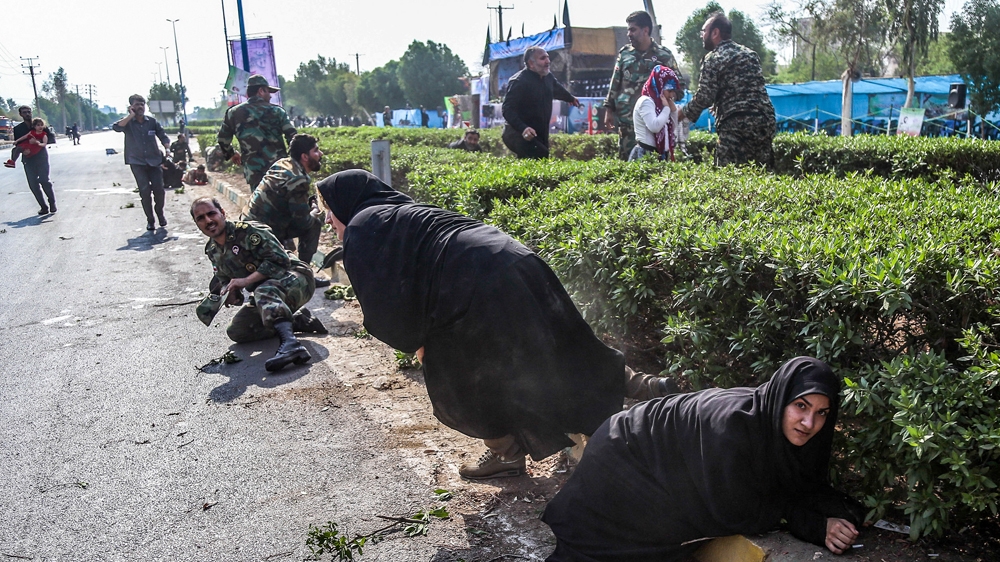
Iran’s Revolutionary Guard has vowed to revenge the attack on a military parade that killed 29 people, including the four attackers, and wounded 70 others.
The Iranian elite force, in a statement on Sunday, said that those behind Saturday’s attack will face a “deadly and unforgiving revenge in the near future”.
Iranian officials blamed two Gulf states and the United States for the attack, accusing them of backing the Arab separatist al-Ahvaziya armed group which claimed responsibility for the attack.
President Hassan Rouhani vowed to deliver a “crushing response“, while Iran’s Supreme Leader Ayatollah Ali Khamenei linked the attack with the US and its “allies in the region”.
The country’s foreign minister, Mohammad Javad Zarif, said “regional terror sponsors” were responsible for the attack, adding he held “their US masters accountable”.
While Iranian officials have not directly named the Gulf states, their comments are believed to be directed at Saudi Arabia, the UAE and Israel, which all have hostile relations with Iran and have promised to counter its influence in the region, including inside the country.
“These terrorists … were trained and organised by two … Gulf countries,” Iranian military spokesperson Abolfazl Shekarchi told the official news agency IRNA.
“They are not from Daesh (an Arabic acronym for the Islamic State of Iraq and the Levant) or other groups fighting [Iran’s] Islamic system … but are linked to America and [Israel’s intelligence agency] Mossad.”
The UAE has denied Iranian allegations alluding to its involvement in training troops that claimed the attack in southwestern Iran.
“The formal incitement against the UAE from within Iran is unfortunate, and has escalated after the Ahvaz attack,” UAE’s Minister of State for Foreign Affairs Anwar Gargash said in a tweet.
“The UAE’s historical position against terrorism and violence is clear and Tehran’s allegations are baseless.”
The US condemned the attack, with its UN envoy saying it took place because Rouhani has “oppressed his people for a long time”.
The attack in Ahvaz came as the country marked the anniversary of the start of its 1980-1988 war with Iraq. Four gunmen dressed in military uniform sprayed bullets into a crowd of marching soldiers, bystanders and government officials watching from a nearby stand.
Al Jazeera’s Zein Basravi, reporting from the capital Tehran, said the “attack for many Iranian communities was very personal”.
“What we are hearing from the revolutionary guards is that they will carry out a swift and violent response, and that is something unique,” he said.
Little is known about the al-Ahvaziya group, but Islamic Revolutionary Guards Corps (IRGC) spokesperson Ramezan Sharif told ISNA it was “funded by Saudi Arabia”.
‘Fight inside Iran’
Mostafa Koshcheshm, a Tehran-based political commentator and journalist, told Al Jazeera that the al-Ahvaziya movement had been “nurtured, supported, and trained by Saudi Arabia”.
“It’s been operating for the past several years. They are looking to cut off and separate Iran’s energy-rich province of Khuzestan from Iran, which is exactly what Saddam Hussein wanted to do,” said Koshcheshm.
“They call themselves Arab nationalists but we know they have very intimate ties to the Mujahedin-e-Khalq,” he said referring to an Iranian exiled dissident group accused of killing thousands of Iranian civilians and officials.
Ahvazi Arabs are a small minority in mainly ethnic Persian Iran but sit on top of the bulk of the country’s 137 billion barrels of oil.
They are divided over whether they want independence or devolution of power within a democratic, federal Iran, but at their most ambitious, some Ahvazi groups want an independent state stretching beyond the borders of Khuzestan, which sits at the head of the strategic Gulf waterway and shares a border with Iraq.
In an interview with Saudi-owned TV channel MBC last year, Saudi Crown Prince Mohammed bin Salman said that the kingdom would take the fight “inside Iran”.
“We won’t wait for the battle to be in Saudi Arabia,” he said. “Instead, we will work so that the battle is for them in Iran.”
Iran summons ambassadors
Within hours of Saturday’s attack, Iran summoned diplomats from Denmark, the Netherlands, and the UK, with IRNA reporting they were “informed of Iran’s strong protests over their respective countries’ hosting of some members of the terrorist group”.
Iran’s Foreign Ministry spokesperson Bahram Qasemi called on Denmark and the Netherlands to extradite the “perpetrators and their accomplices” to stand trial, IRNA reported.
“It is not acceptable that the European Union does not blacklist members of these terrorist groups as long as they do not perpetrate a crime on … European soil,” Qasemi was quoted as saying.
from Viral Trendy Update https://ift.tt/2I7RTNE
via IFTTT


0 Comments